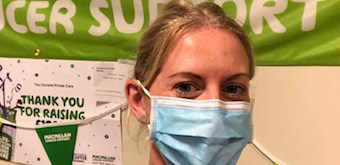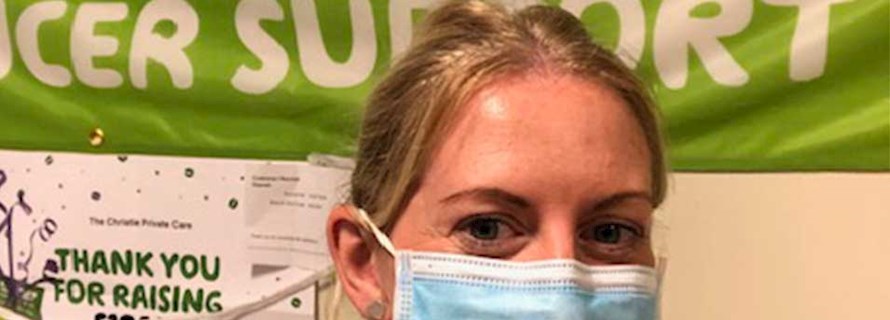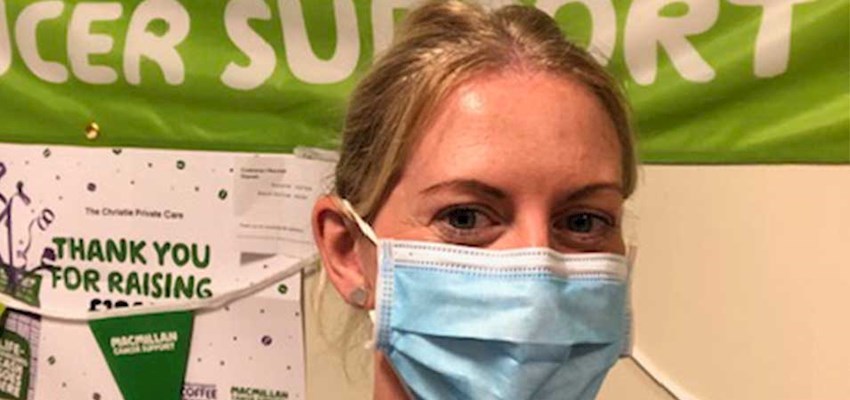Our healthcare heroes - Life during a pandemic and beyond: meet Sarah
Sarah Machin, lead Macmillan clinical nurse specialist (CNS) at The Christie Private Care
What did a typical day look like for you before the pandemic?
In my role as a lead CNS I look after a team of seven – our collective role is to speak to patients who have been diagnosed with cancer, book scans and request multidisciplinary team meetings where appropriate. And understanding their needs and concerns about their diagnosis and treatment plan. The majority of the patients we see are newly diagnosed and have a lot of questions about the next steps. We work closely with their consultant, and the wider network of healthcare professionals, to help answer those queries and ensure they feel reassured.
I also spend time carrying out holistic needs assessments – where I ask patients if they feel they need additional financial, psychological or familial support. We want them to leave the conversation with us feeling much more positive about their next steps, and that things can be done to help them.
I also spend time carrying out holistic needs assessments – where I ask patients if they feel they need additional financial, psychological or familial support. We want them to leave the conversation with us feeling much more positive about their next steps, and that things can be done to help them.




Did your role change during the COVID-19 pandemic?
Ultimately, our primary role is to support patients. So although we couldn’t support them in exactly the same way when COVID-19 was at its peak, we were still able to talk to them about their concerns and fears over the phone, not just about their cancer diagnosis and treatment plan, but about the virus and its impact too. I think that this was incredibly important for patients during this time of uncertainty.
When the virus was at its peak, we had to prioritise care for time-critical patients, while also continuing to support patients whose treatment was paused. Understandably, patients were concerned about COVID-19 and what this meant for them. In the beginning it was difficult to advise patients as so much was unknown but, as we've learned more about COVID-19 and as the peak has passed, we've been able to reassure patients and re-start treatment safely.
When the virus was at its peak, we had to prioritise care for time-critical patients, while also continuing to support patients whose treatment was paused. Understandably, patients were concerned about COVID-19 and what this meant for them. In the beginning it was difficult to advise patients as so much was unknown but, as we've learned more about COVID-19 and as the peak has passed, we've been able to reassure patients and re-start treatment safely.
Were you required to train or work in different areas during this time?
It was important the CNS team were set up to work from home, which was quite complex to coordinate as I’m far from an IT whizz. Two of the team were considered vulnerable and were required to shield, so ensuring that they could work remotely and remain connected to the team was key. I even created a YouTube video to guide the team through some of the remote working processes. We also had a rota so there were always CNS in the hospital to provide care for patients whose treatment had continued.
What are the positive things you’ve taken from working during a global pandemic?
I think it has been really interesting to understand that certain elements of my role can be successful from home. Having virtual consultations with patients have been easy to set up and connect, and the patient still feels that they’re getting the same level of support as they would have in hospital. For example, for patients who undergo treatment once a month, two weeks after their treatment we will call them to see how they’re doing, ask them if they have any concerns or are struggling with anything. It's so important that amidst the pandemic they don’t feel forgotten about and know that we’re still here.
How have your patients responded to the pandemic?
Even though patients have been understandably anxious, as they’re unable to have a family member or friend come in with them for scans and treatment, they are very accepting of the safety reasoning behind it. During this period we have been spending a lot more time with patients. Either sitting with them during their chemotherapy or staying with them for a while after they’ve had their scan results, which I think they’ve really needed.
Watch this short video to learn more about the way HCA Healthcare UK has adapted the way healthcare is provided in its hospitals and clinics.